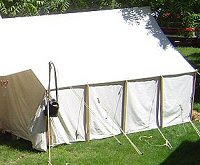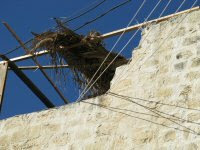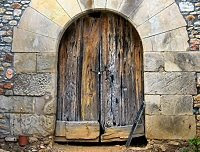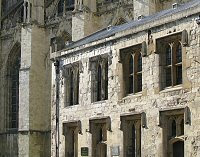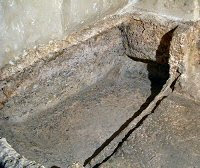 copy of it recently.
copy of it recently.The story goes that when Peter and John arrived at the empty tomb, they saw that the grave wrappings had been thrown in a heap, but at the other end of the tomb, the napkin that had covered Jesus face was neatly folded.
There was a convention that when a man ate his meal, the servant would watch. If the master threw his napkin down untidily this was a sign that he'd finished and the servant would begin to clear the table. But if the master folded his napkin this showed he intended to return to finish the meal later.
So the folded napkin in the tomb was significant because to Yahshua's followers it meant, 'I am coming back in a short while'. It's still a great story even though it may not be true. But what is true (and is important) is that Jesus did rise from the grave and that he will indeed return!
Here's a link to the full version that's been doing the email rounds. This article repeats the full text of the story and then explains why it's not really true.
I also found a post on an internet forum that quoted some great notes from Athol Dickson. You'll need to scroll down quite a way to find it, so for convenience I've included it in full below. (Athol Dickson is an acclained Christian author, winning the Christy Award in 2006 and again in 2008.) Not only does he explain that the story is incorrect, he also explains and expands on other aspects of the graveclothes and draws out a good deal of valuable insight.
Lent Among the Folds
Wednesday, February 6, 2008
Beginning with the end in mind I pondered the empty tomb on this first day of Lent. I remembered an email someone forwarded to me recently, one of those sentimental legends people pass around the Internet. It starts with one verse from the Apostle John’s eyewitness description of Jesus’ empty tomb: “He saw the strips of linen lying there, as well as the burial cloth that had been around Jesus' head. The cloth was folded up by itself, separate from the linen.” (John 20:6-7) Focusing on that last detail, the folded cloth, the email says:
“In order to understand the significance of the folded napkin, you have to understand a little bit about Hebrew tradition of that day. The folded napkin had to do with the Master and Servant, and every Jewish boy knew this tradition. When the servant set the dinner table for the master, he made sure that it was exactly the way the master wanted it. The table was furnished perfectly, and then the servant would wait, just out of sight, until the master had finished eating, and the servant would not dare touch that table, until the master was finished. Now if the master was done eating, he would rise from the table, wipe his fingers, his mouth, and clean his beard, and would wad up that napkin and toss it onto the table. The servant would then know to clear the table. For in those days, the wadded napkin meant, "I'm done". But if the master got up from the table, and folded his napkin, and laid it beside his plate, the servant would not dare touch the table, because… The folded napkin meant, ‘I'm coming back!’”
It is a nice little story, but I’ve made something of a study of Judaism, including Jewish traditions and cultural practices at the time of Jesus, and never have I heard of such a tradition. So at first I was skeptical. We Christians often try to read too much symbolism into Jewish practices. For example, you will hear it solemnly pronounced at churches around Easter time that the baked brown stripes and rows of little holes in those unleavened wafers Jews use in their Pesach seder (a Passover supper, or service) symbolize the wounds on Jesus’ body when he was crucified. But those stripes and holes only came about in modern times when people started baking matzo mass-production style in factories. Unleavened bread in Jesus’ time would have had neither stripes, nor holes. So we need to use some common sense when we read or hear these kinds of quasi-Messianic theories about Judeo/Christian symbolism.
Still . . . the little story did get me thinking about the folded cloth in the empty tomb, and a certain ancient Jewish dinner table. Since at least the time of Jesus many Jewish families have used a folded napkin in the Pesach seder to hide the afikomen, which is a broken piece of unleavened bread hidden away until the end of the meal, when it is “found” and eaten. We know it was this last piece of bread—the broken afikomen quite possibly retrieved from a hiding place within the napkin folds—that Jesus held aloft and said, “Take and eat; this is my body.” We know this because the next words in the Last Supper account are, “After the supper…” and the Talmud tells us this broken piece of bread was the last food eaten in the seder.
Only three days separated the empty tomb from the moment the disciples witnessed Jesus comparing his own broken body to the afikomen taken from the napkin folds. It makes sense that the folded cloth in the empty tomb would symbolize what Jesus had just accomplished, his broken body risen from the folds of the earth, rather than evoking a second coming thousands of years in the future as the little story above would have us believe. Foremost on Jesus’ mind as he folded his burial cloth would have been the disciples, the people for whom he had just risen from the dead, the people who must now be taught the meaning of the cross and empty tomb. If the gesture of that folded cloth was connected with a dinner table tradition at all, it was not just any Jewish master’s supper, but the Master of all Master’s own Last Supper. Jesus was not thinking of his second coming; he was reminding his disciples to “take, eat, and remember me.” Or so I thought.
Then I remembered the Lord never does just one thing at a time.
It is a sign of God’s omniscience that He accomplishes countless good things with a single word. And in perfect keeping with this fact, God’s “word,” the Bible, often speaks of many things at once. So I began to wonder if that folded cloth might be about both of those Jewish dinner table traditions, the Pesach seder / Last Supper, and a typical Jewish master’s signal to his servant. With that in mind, I remembered this: “For whenever you eat this bread and drink this cup, you proclaim the Lord's death until he comes.” (1 Corinthians 11:26) There they are together in one verse: the gospel and the second coming, and both of them connected with the Last Supper. If the bread and wine proclaim the Christ’s death in our place until he comes again, perhaps the folded cloth does the same, pointing to the meaning of the Gospel and to the promise Jesus will come again.
My Lenten meditation was producing fruit. I began to ponder other possibilities, and of course, the Bible being an endless divine self-revelation, several came to mind.
I have not read Sigmund Brouwer’s book, The Carpenter’s Cloth, but I understand it says carpenters and other manual laborers in first century Palestine, as today, kept a cloth handy to wipe away their perspiration as they worked. Being illiterate for the most part, they could not leave an invoice or a note to their customer when a project was finished, so it was a common tradition to signify a completed contract by leaving that cloth on or near the work, neatly folded. It was a tactful way of saying, “I’ve completed the work.” Jesus was a carpenter after all, so the folded cloth might have come naturally to him as a fitting gesture that his Passion was complete. This ties in nicely with the fact that the afikomen was the final piece of bread, and with Jesus’ own words on the cross, “It is finished.” But when the workman sends that signal, he also sends another. The workman’s folded cloth also asks for something. It tells the one for whom the work was done, “I’ve finished my part, now it’s your turn to deliver payment.” We can never repay Jesus for giving his life in place of ours, nor does he expect it. But he does expect our faith to lead to Christian love—to righteous action—otherwise we have no faith at all. Jesus was very clear on this: “If you love me, you will obey what I command,” (John 14:15), and of course we have James writing these famous words on the same subject: “Faith without works is dead,” (James 2:26).
Once I really started looking, I kept finding more. John tells us the head covering was neatly folded while the rest of the linen that covered Jesus’ body was only “lying there.” If that means only the cloth around the head was folded, signifying completion, while the cloth from around the body was wadded or disheveled, it might relate to these words, which Paul wrote about the very moment when Jesus rose from the dead: “[Christ] is the head of the body, the church; he is the beginning and the firstborn from among the dead….” Might the contrast between that neatly folded head cloth beside the disheveled body cloth signify that Christ’s “body” on earth, the church, must respond to what the head has done? While for Jesus “it is finished,” we still have work to do on earth. Surely Jesus knew his followers in later years would cherish Paul’s abiding metaphor for the church as his body. Surely Jesus also knew that some of us would look back on those two cloths in the empty tomb and connect them with Paul’s metaphor, and be reminded in yet one more way that “Faith without works is dead.”
I found another, more mundane explanation in Adam Clarke’s great old commentary: “The providence of God ordered these very little matters, so that they became the fullest proofs against the lie of the chief priests, that the body had been stolen away by the disciples. If the body had been stolen away, those who took it would not have stopped to strip the clothes from it, and to wrap them up, and lay them by in separate places.” Matthew Henry agrees with Clarke: “Any one would rather choose to carry a dead body in its clothes than naked. Or, if those that were supposed to have stolen it would have left the grave-clothes behind, yet it cannot be supposed they should find leisure to fold up the linen.” In other words, that folded head cloth might have been Jesus’ way of saying, “No one stole me away. On the contrary, I rose up alone. I walked out alone. I alone did this, for I alone could do it. I am Almighty God.”
Still meditating on the layers in the folded cloth, I realized John has some kind of fascination with cloths and clothing. In an earlier part of John’s gospel, he writes of the resurrection of Lazarus, using language very similar to his description of the cloths that Jesus left behind. He tells us of Lazarus’s face cloth and the “strips [note the plural] of linen” that Lazarus had upon his body. When John gets to the crucifixion, again he writes of a cloth that covered Jesus. Strangely, out of all the details he might have mentioned at the outset of this all-important portion of his story, John chooses to begin with soldiers casting lots for Jesus’ underclothes. He takes pains to tell us the garment was “seamless, woven in one piece from top to bottom.” It is as if he wants us to compare Jesus’ clothes in a before-and-after kind of way. He wants us to notice that Jesus wore one seamless cloth before his death, and many pieces after. But why? Why should this “disciple whom Jesus loved” describe Jesus' underwear of all things, instead of starting the crucifixion scene with his dying rabbi’s suffering? Why take the trouble to tell us very specifically Jesus wore something “seamless, woven in one piece from top to bottom” before the crucifixion, but left behind many separate pieces afterwards?
Before Jesus’ sacrifice on the cross, the tabernacle / temple was the site of countless animal sacrifices for the sins of God’s chosen people. This sacrificial process was overseen by a high priest. The first century Jewish historian Josephus tells us this high priest wore an undergarment that was “…not composed of two pieces, nor was it sewed together upon the shoulders and the sides, but it was one long vestment so woven as to have an aperture for the neck; not an oblique one, but parted all along the breast and the back." (See Antiquities of the Jews, book 3, chapter 7, sentence 4.) In other words, the Jewish high priest wore something seamless, woven in one piece. The author of the New Testament book of Hebrews tells us the tabernacle (which later became the temple in Jerusalem) symbolized God’s dwelling place in heaven, the animal sacrifices were symbols of Jesus’ crucifixion, and the high priest symbolized Jesus, the ultimate priest, who entered God’s actual dwelling place in heaven to offer himself as the ultimate sacrifice for our sins. The rituals at the Jewish tabernacle and temple were living prophesies, intended to prepare the Jewish people to recognize their Messiah when he came. Hebrews also tells us Jesus’ sacrifice was perfect and final, unlike those of the high priests. After Jesus’ death and resurrection, there is no more need for Messianic prophesies, because the real thing has been done. So the contrast between the single, seamless garment Jesus wore closest to his skin as he offered the final sacrifice, and the many cloths he left behind afterwards, symbolizes the fact that there is no more need for the temple, or the sacrifices, or the high priests, or the seamless garments they wore. The ultimate high priest has offered the ultimate sacrifice, which is all anyone will ever need from now on, and forevermore.
In close relation to that, yet another possibility occurred to me. I remembered Numbers 4:5-15 where the Bible says whenever the tabernacle was moved, all of the mysterious, prophetic items within it from the Ark of the Covenant to the Bread of the Presence were to be covered from sight with some kind of cloth. Only when the tabernacle was set up again and those items were again out of sight behind curtains could the covering cloths be removed. We know the main purpose of the tabernacle from God’s own words in Exodus 25:8: "Then have them make a sanctuary for me, and I will dwell among them.” It was built for prophetic symbolism as I already mentioned, but the purpose of the symbolized Messiah was to establish intimate fellowship between us and God. We know this, because John used the very words of Exodus to describe Jesus’ mission: “The Word became flesh and made his dwelling among us.” But look at the next thing John says of Jesus in that same verse: “We have seen his glory, the glory of the One and Only, who came from the Father, full of grace and truth.” (John 1:14)
To see the glory of the One and Only, the Lord Most High . . . what an extraordinary claim.
Any Jewish student of the Torah will tell you it's impossible. The purpose of the cloths in tabernacle days was to hide even the symbols of the Lord from unclean human eyes, lest the people be literally consumed by God’s perfect holiness like moths flying too close to a purifying fire (as were Nadab and Abihu). There was a time, as the Lord told Moses, when no one could see His face and live, but Jesus came to change that, and Jesus did change that, as John says very clearly: “we have seen his glory.” There was a moment when John saw a hint of Jesus’ glory. But I don’t think that’s what John meant. The glory John described as “the One and Only” was not just the risen Christ, but also the fearfully holy Creator of Everything, somehow (we can never know how) made visible and touchable. Remembering his warnings to Moses thousands of years before (“cover the Ark”, “you must not see my face”) the God who was Jesus took time to fold that face cloth so those who knew his Torah would notice it, and think about it, and perhaps come to understand some small portion of the wonderful fact that it was no longer necessary.
I enter Lent this year acutely aware that I once hid from God instinctively. But the need for coverings between God and me is over. Jesus died, and the temple curtain hiding the Ark of the Covenant was split from top to bottom (another covering cloth divided, of course). Jesus rose again, with his holy face uncovered. And Jesus can lift away all the other barriers between me and my Creator, if I will just believe.
Just as there is no end to God, so everything Jesus said and did means more than I can ever fully know. In fact, I’m still far from understanding everything there is to know about even one detail: that little folded cloth. But beginning with the end in mind on this first day of forty in the wilderness of Lent, I have come to see the empty tomb as far from empty. It is filled to overflowing with eternal riches, so it is not the end I had in mind at all, but the best of all beginnings.
Posted by Athol Dickson
--------------------
"One thing I have asked of the Lord and that will I seek after: that I may dwell in the house of the Lord all the days of my life and to gaze on the beauty of the Lord and to inquire in His temple."



